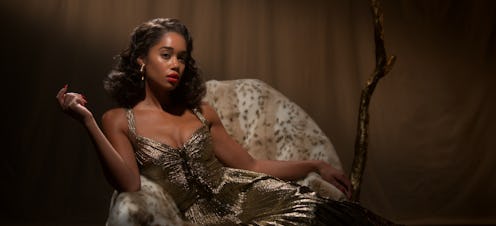
There are a few seconds in the final episode of Hollywood in which all you can hear is the sound of Camille Washington's heartbeat. She's just walked onstage to accept the Oscar for Best Actress, and she looks down at her award, feeling its weight as much as the gravity of the moment. The win doesn't just belong to Camille; it belongs to the families of color huddled around their radios, crying silently as they wait to hear the speech of the first black woman to ever win such an award. Hollywood star Laura Harrier still remembers being on the other end of that experience.
"I think I was 12 when [Halle Berry] won Best Actress [at the Oscars], and I definitely remember that moment and feeling the importance of that," Harrier recalls of Berry's 2002 win for Monster's Ball, which made her the first black woman to receive the award. "It's unfortunate that it took that long to happen, but I remember my excitement and feeling represented and seen in a place that I hadn't felt seen before."
It's trailblazers like Berry that Harrier channeled while preparing for her role as Camille in the 1940s-set Netflix series. In particular, she looked to Dorothy Dandrige, who became the first black woman to be nominated for a Best Actress Oscar in 1954, though she ultimately lost to Grace Kelly. Harrier also idolized actors like Angela Bassett, Nia Long, Jada Pinkett Smith, and Queen Latifah growing up — which proved to be a bit of a full circle moment for her, considering Latifah plays Hattie McDaniel, Camille's mentor, in Hollywood.
"It was just really cool being able work with somebody like Queen Latifah, who has been doing this for such a long time and is such a veteran and somebody that I admire," Harrier says. "For me, as Laura, looking to Queen Latifah, it was very similar to how Camille would be looking to Hattie McDaniel."
Harrier also related to the fact that as a woman of color, Camille is initially only cast in regressive and stereotypical roles, something she's felt in her own career despite the progress the film industry has made since the '40s. She points to people like Janet Mock, who served as a director and executive producer on Hollywood, as an example of someone who's pushing to create more opportunities for women, people of color, and members of the LGBTQ+ community on and off screen. But she hopes that Hollywood will continue to move the conversation forward.
"I think the big question the show poses is, 'What would the world look like had these things been able to happen, had there been a black woman winning Best Actress and being represented onscreen who's intelligent and beautiful and glamorous and capable of her own destiny? How would the world be different had there been able to be an openly gay writer, had a woman been in charge at that time?" Harrier says. "I think we would be living in a very different world."